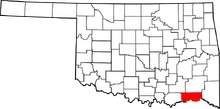|
"Labor omnia vincit" | |||
| Capital (and largest city) |
Hugo | ||
| Language | English | ||
| Governor | |||
| Lieutenant Governor | |||
| Area | 801 sq mi km² | ||
| Population | 15,000 | ||
| Independence | July 4th, 1986 | ||
| Currency | Barter | ||
Pre-Doomsday
The area was acquired by the United States through the Louisiana Purchase and became part of the new Arkansas Territory. On April 1, 1820, Arkansas created Miller County which included most of the land that would become Little Dixie. A post office at Miller Courthouse was established on September 7, 1824. Per a treaty signed on January 20, 1825, the land west of a line "one hundred paces east of Fort Smith, and running thence, due south, to Red river" was ceded to the Choctaw Indians. The residents west of the line made a futile attempt to be exempted from the treaty but failed. They burned the courthouse and most of the records before they left.
Some Choctaws had been moving into the region from Mississippi since the Treaty of Doak's Stand in 1820. Following the Treaty of Dancing Rabbit Creek in 1830, the federal government began their forced removal. By 1834, nearly 8,000 Choctaws had arrived in their new land over the "trail of tears and death". At Nanih Waiya, near the present Tuskahoma Council House, they established a capital and adopted the first constitution ever written in what is now Oklahoma. The Choctaws actively supported the Confederacy during the Civil War and were allowed to keep most of their land in eastern Indian Territory. In 1898, after pressure from Washington, they agreed to an allotment plan administered by the Dawes Commission. Their excess lands and those of the allied Chickasaw were opened to settlement by non-Indians.
The damage of the Civil War and a long decline in cotton prices meant years of a poor economy in the mostly rural South. Many citizens left the South to seek opportunities in new western lands. When the Indian lands were opened, Southerners flocked to the Indian Nations for a new start, especially to the old Choctaw reserve. So many homesteaded in the area that they markedly influenced the politics and culture of the region. They made much of what is now Oklahoma culturally a southern state. In the decades that followed, this area became known as Little Dixie.
Post-Doomsday
Hugo became isolated with strikes to the north and west. With no word from the federal or state government, the towns leaders declared a state of emergency and the county government grant "temporary" emergency powers to the mayor of Hugo. Some sporadic contact was made with nearby Broken Bow but stronger ties between the two communities was still a ways away.
With the lose of most of the town's electricity, the people of Hugo were forced to return to a late 19th century style of living. Food soon became an issue for Hugo. Many people returned to the old fashion hunter-gatherer role searching for animals and and small berries to eat. Farming soon became a critical industry.
Foreign Relations
Hugo has been in constant contact with Broken Bow since January 1984 but never formalized relations until 1986. Both city-states decided to remain independent due to the logistics of governing a large area. However since the LoN arrived in the area there has been talk of unifying the small towns in south-eastern Oklahoma.

